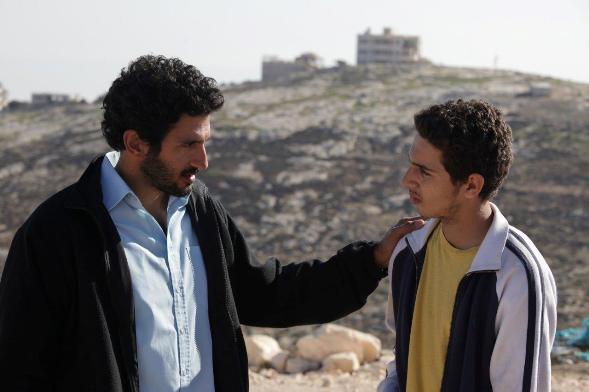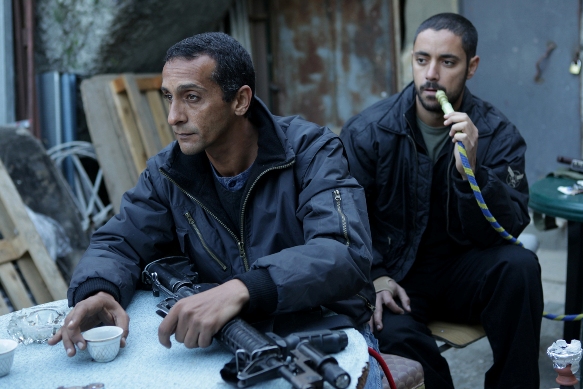
It feels a little churlish to be critical about Bethlehem, especially when there are many things to be said in favour of the film. There is the charged, engrossing script, for one thing; some exceptional acting, the assured and steady hand of debutant director Yuval Adler at the helm. But there’s yet something just not quite right.
But first, the storyline: 17 year old Sanfur is the younger brother of a ranking Palestinian militant, the commander of the Al-Aqsa Brigade in Bethlehem. He also happens to be an informant for the Israeli security service, nurtured over two years by the charismatic Razi, convincing yet coercive and manipulative. The relationship between Razi and Sanfur is a curious pas de deux, one predicated as much on emotional support as financial gain. Sanfur is never going to match up to the legend of his esteemed elder brother – the dismissive treatment he receives from his father makes this quite clear – and so the relationship between informer and handler shapes into a surrogate parental bond. But Razi is teasing out potentially dangerous information from his charge. These things are never destined to end well.
Bethlehem, the film, is very much a masculine playground, and I’m not sure there is very much one can say about this other than to simply observe that this is the way things are. What this does mean though is that Adler is presented a rich palette of emotional nuance with which to colour out his characters, one that he uses well. Razi and Sanfur (Tsahi Halevy and Shadi Mar’i respectively, Mar’i is not a professional thespian) are both remarkable, vacillating between cocky self-assurance and circumspect self-doubt. Ibrahim, Sanfur’s brother is a largely invisible presence (of necessity, naturally); his deputy, the scheming and ambitious Badawi (Hitham Omari, again a non-professional actor and again magnificent) gives the narrative an intriguingly duplicitous sub-text. Hamas are trying to muscle in on Al-Aqsa territory, even as both try to maintain the work of an organised and unified resistance. Israeli security are trying to crush the resistance. There are women, but their roles are not so much secondary – which in the context would understandable – as token, which is less so.

But my reservations about Bethlehem – and I seem very much alone in this, given the film’s success at Haifa, Venice and most recently the Israeli Academy Awards, meaning that it will be the country’s submission for next year’s Best Foreign Film Oscar – lie in a different direction. Bethlehem is an exciting, engaging film, evenly paced to a denouement of Shakespearian proportions. Razi discovers that his feeling for his charge are clouding his professional judgement; Sanfur, for his part, can no longer be sure about who he can trust and who he cannot, and is forced into an emotional and pragmatic cul-de-sac. Adler – who co-wrote the script with veteran Palestinian journalist, Ali Waked – creates a taut, tight thriller, that scarcely allows the audience room to breathe.
Still, there is something not of the present about the film. If Bethlehem had been made, say, a decade ago, it would possess the urgency and authenticity of a documentary, testifying to the moral and political ambiguities of the moment. If it were to be made perhaps 10 years from now, it would possess the reflective gravitas that can come with the benefit of hindsight. But now, it feels out of time and out of place. It is superior technical filmmaking, and nobody can – or should – take this away from the crew. But because of the context, it feels much more an entertainment than it should. And even though I often feel that we are at risk of being overwhelmed by films that take themselves too seriously, for once I can’t help but feel that the subject matter of Bethlehem deserves a little more.
Bethlehem
Directed by Yuval Adler, Screenplay by Yuval Adler and Ali Waked
Starring Shadi Mar’l, Tsahi Halevy, Hitham Omari, Tarek Copti
99 minutes, Hebrew and Arabic with English Subtitles.





